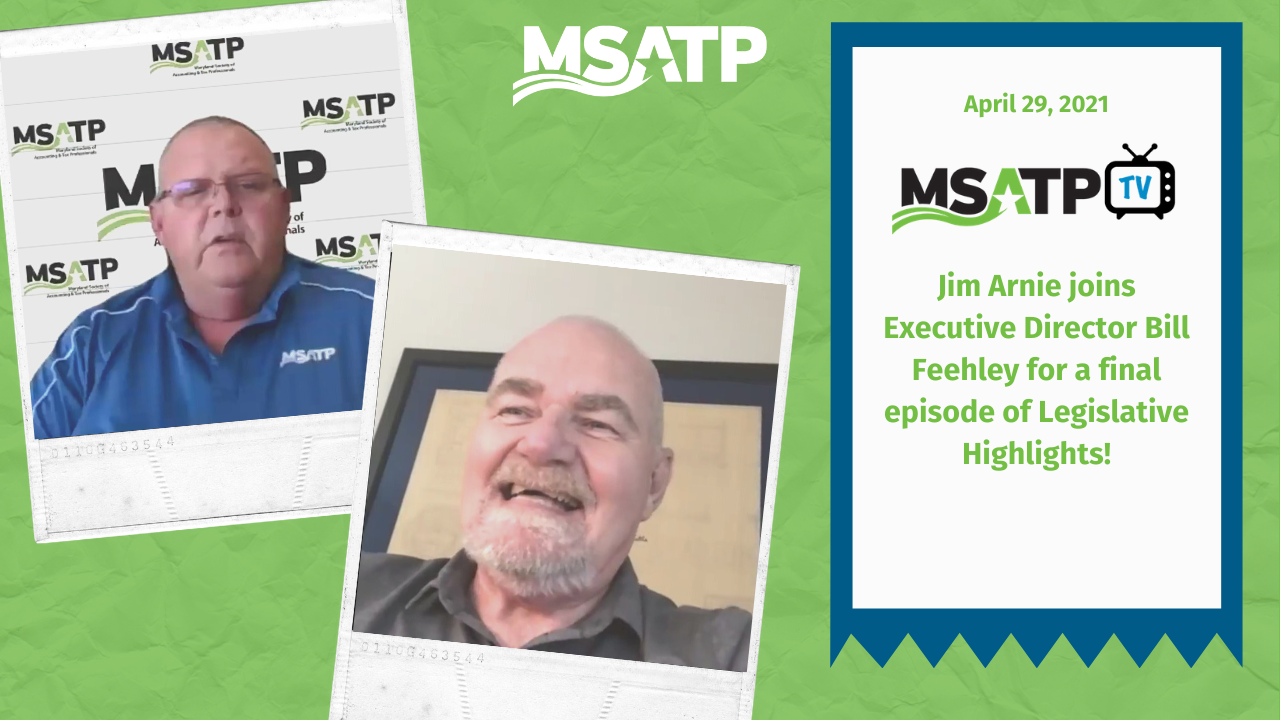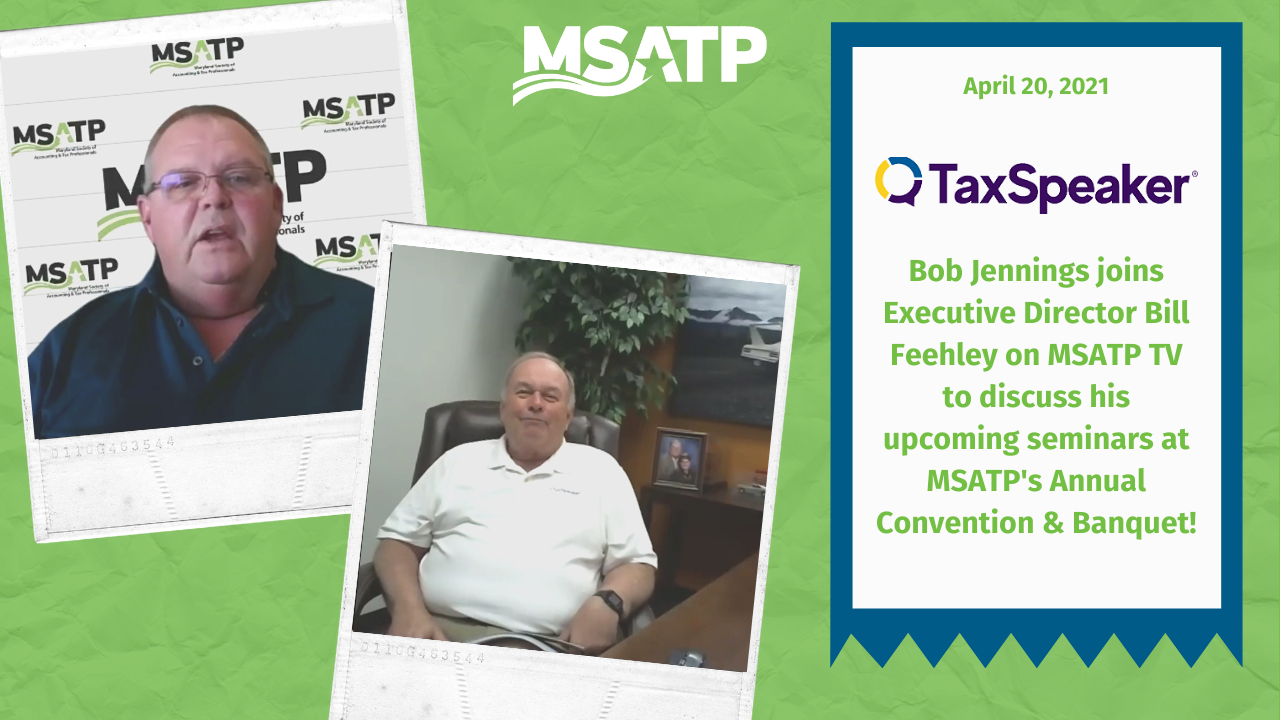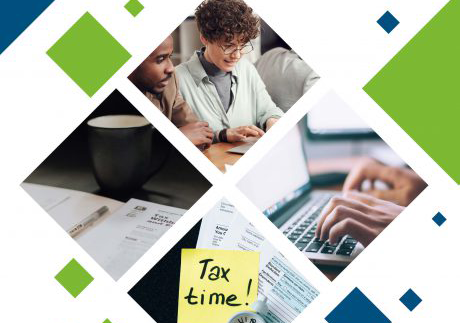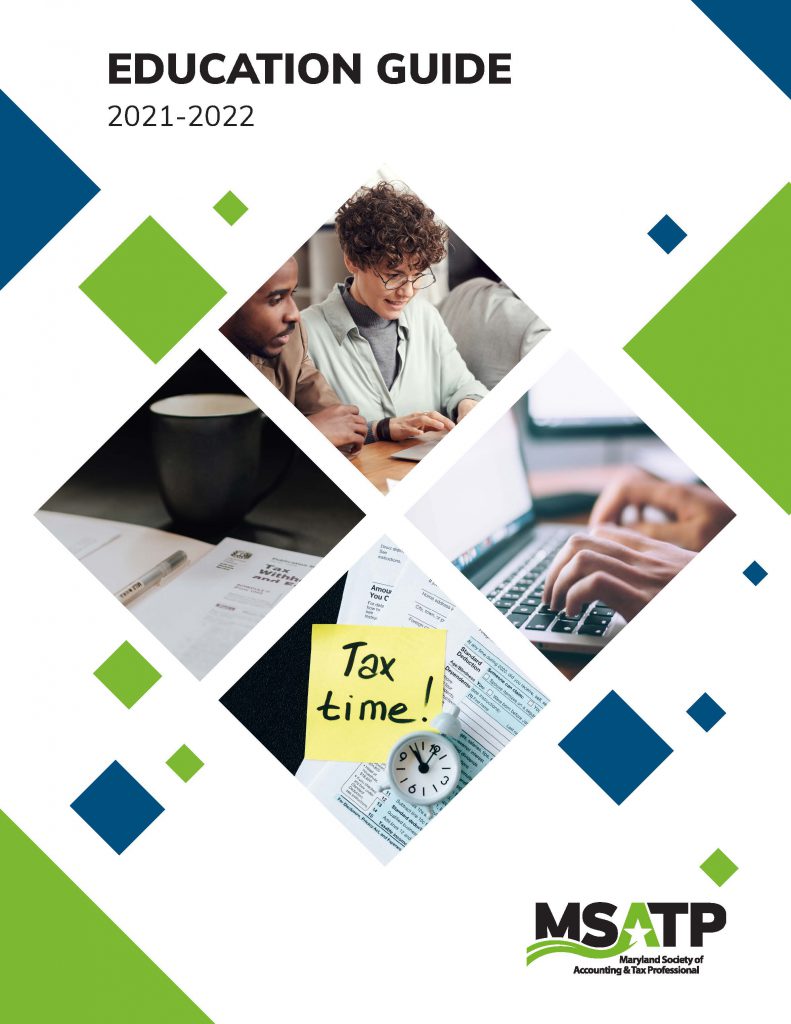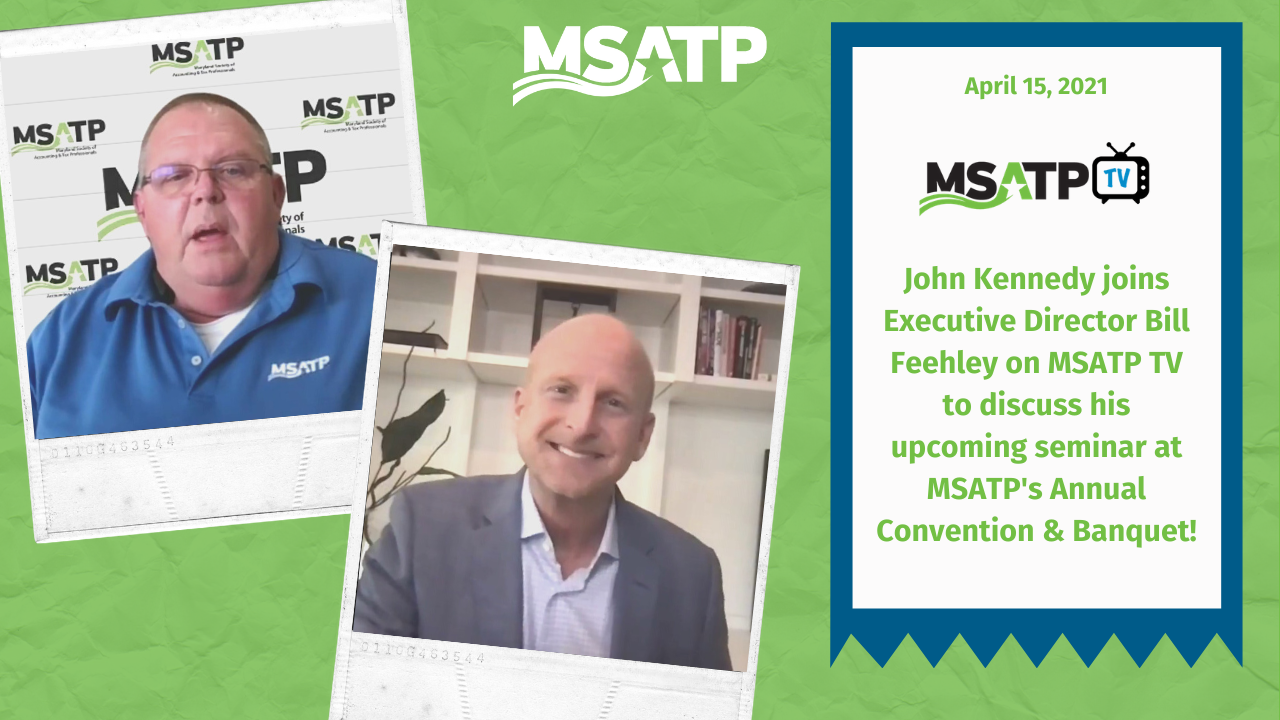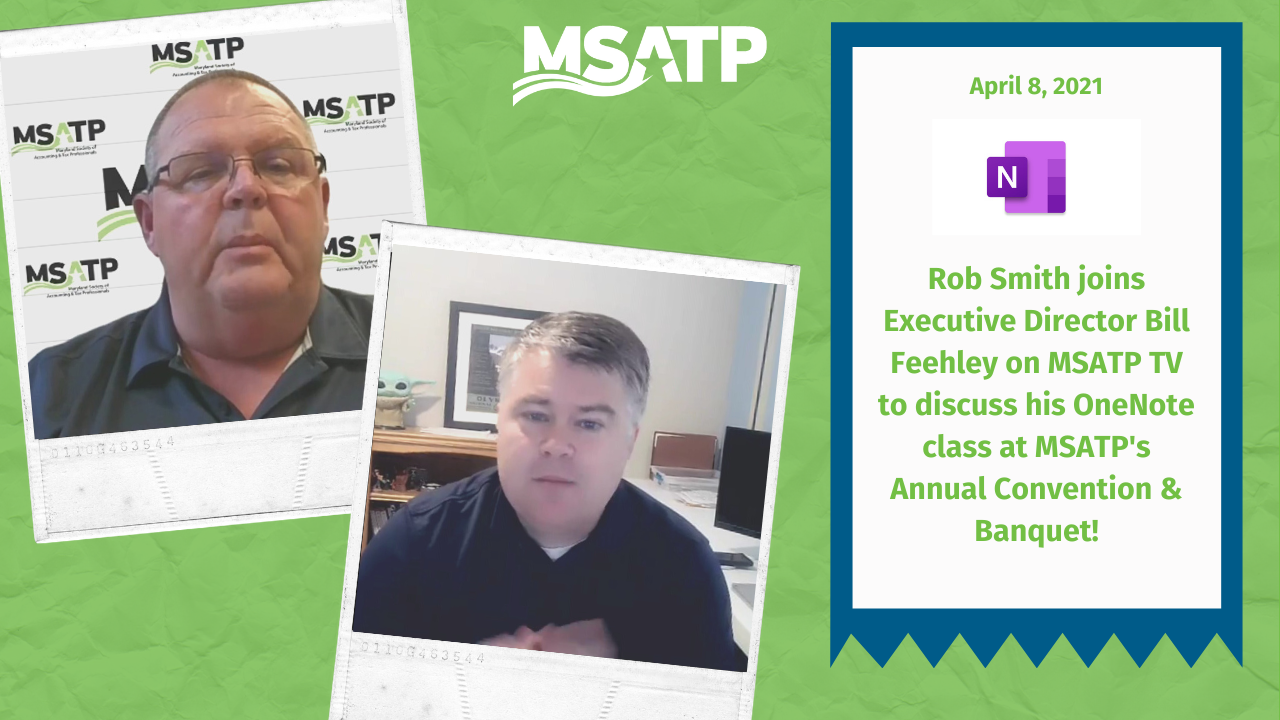
On this week’s episode of MSATP TV, Rob Smith joins Executive Director Bill Feehley to tell us about his class OneNote – Your Own Personal Internet he will be presenting at the MSTAP Annual Convention & Banquet in Ocean City, MD on June 4th. Be sure to like/follow us on Facebook to catch all the MSATP TV episodes live.
Watch on YouTube.

The Young Professionals Leadership Program Application Deadline Extended | Applications Must Be in by April 16, 2021
If you are looking to build and develop your leadership skills or have an employee you would like to recommend to MSATP’s Young Professionals Leadership Program, the deadline to apply has been extended to April 16, 2021!
The mission of this year-long educational training and development program is to encourage qualifying individuals who display leadership skills to take charge in the new wave of the accounting and tax preparation professions. This program affords employers a cost-effective option to further the development of their staff, strengthen leadership capacity, and establish pathways to leadership within their practice.
MSATP has engaged top leadership trainers to build a curriculum that specifically fosters a community of support and resource to students and young professionals who show tremendous capability and enthusiasm for the profession. Only 10 professionals and students will be accepted into the program.
For more information, click here.
IRS Provides Guidance for Employers Claiming the Employee Retention Credit for First Two Quarters of 2021 | A-2021-74
The Internal Revenue Service issued guidance for employers claiming the Employee Retention Credit under the Coronavirus Aid, Relief, and Economic Security Act (CARES Act) modified by the Taxpayer Certainty and Disaster Tax Relief Act of 2020 (Relief Act).
Notice 2021-23 explains the changes to the Employee Retention Credit for the first two calendar quarters of 2021, including:
- the increase in the maximum credit amount,
- the expansion of the category of employers that may be eligible to claim the credit,
- modifications to the gross receipts test,
- revisions to the definition of qualified wages, and
- new restrictions on the ability of eligible employers to request an advance payment of the credit.
As a result of the changes made by the Relief Act, eligible employers can now claim a refundable tax credit against the employer share of Social Security tax equal to 70% of the qualified wages they pay to employees after Dec. 31, 2020, through June 30, 2021. Qualified wages are limited to $10,000 per employee per calendar quarter in 2021. Thus, the maximum employee retention credit available is $7,000 per employee per calendar quarter, for a total of $14,000 for the first two calendar quarters of 2021.
For more information, click here.
Treasury, IRS Provide Guidance on Tax Relief for Deductions for Food or Beverages from Restaurants | IR-2021-79
The Treasury Department and the Internal Revenue Service issued Notice 2021-25 providing guidance under the Taxpayer Certainty and Disaster Relief Act of 2020. The Act added a temporary exception to the 50% limit on the amount that businesses may deduct for food or beverages. The temporary exception allows a 100% deduction for food or beverages from restaurants.
Beginning Jan. 1, 2021, through Dec. 31, 2022, businesses can claim 100% of their food or beverage expenses paid to restaurants as long as the business owner (or an employee of the business) is present when food or beverages are provided and the expense is not lavish or extravagant under the circumstances.
For more information, please click here.
IRS Issuing Third Economic Impact Payments to Non-Filers and Most Federal Beneficiaries | COVID Tax Tip 2021-43
The IRS continues to issue the third Economic Impact Payment to eligible individuals. This includes Social Security recipients and other federal beneficiaries who do not normally file a tax return. Most of these payments will be sent electronically and received on April 7.
Most of these payments will be sent electronically – by direct deposits or to existing Direct Express cards – they should arrive on the official payment date of April 7.
This round of third payments applies to eligible Social Security retirement, survivor or disability, Supplemental Security Income, and Railroad Retirement Board beneficiaries who don’t file tax returns. In addition, many federal beneficiaries who filed a 2019 or 2020 tax return or used the Non-Filers tool last year were issued Economic Impact Payments, if eligible, during the last three weeks, along with other taxpayers.
For more information, click here.
IRS Extends Additional Tax Deadlines to May 17 | COVID Tax Tip 2021-45
Following the extension of the filing and payment deadline for individuals to May 17, 2021, the IRS announced other tax deadline extensions to the same date.
Here’s what’s affected:
Contributions to IRAs and health savings accounts
People now automatically have until May 17, 2021, to make 2020 contributions to their:
- Individual retirement arrangements
- Health savings accounts
- Archer medical savings accounts
- Coverdell education savings accounts
The deadline for reporting and paying the 10% additional tax on amounts included in gross income from 2020 distributions from IRAs or workplace-based retirement plans is now May 17, 2021. Lastly, the due date for Form 5498 series returns related to these accounts is now June 30, 2021.
2017 unclaimed refunds The law provides a three-year window to claim a refund. Normally, April 15, 2021, is the deadline to claim a refund from tax year 2017 but, the IRS has extended it to May 17, 2021. To get the unclaimed refund, a taxpayer must properly address and mail the tax return, postmarked by May 17, 2021. If a taxpayer doesn’t file a return within three years, the money becomes property of the U.S. Treasury.
Foreign trusts and estates Foreign trusts and estates with federal income tax filing or payment obligations, who file Form 1040-NR, now have until May 17, 2021.
2021 Annual Filing Season Program application deadline Tax return preparers who’d like to participate in the Annual Filing Season Program for calendar year 2021 now have until May 17, 2021, to file their application with the IRS.
No extension for estimated tax payments April 15, 2021 is still the deadline to make first quarter estimated tax payments. Withholding is automatic for most employees, but some taxpayers’ income isn’t subject to income tax withholding. These taxpayers must generally make quarterly estimated tax payments. Income that may require estimated tax payments includes:
- Self-employment
- Interest
- Dividends
- Alimony
- Rentals
For more information, please click here.
Join the Tax Payer Advocacy Panel and Help Improve the IRS; Apply by May 14 | IR-2021-73
The Internal Revenue Service today announced it is seeking civic-minded volunteers to serve on the Taxpayer Advocacy Panel (TAP).
The TAP is a federal advisory committee that listens to taxpayers, identifies major taxpayer concerns and makes recommendations for improving IRS service and customer satisfaction.
Taxpayers interested in serving on the panel may apply between April 5 and May 14.
National Taxpayer Advocate Erin Collins recently expressed her appreciation for the contributions of TAP volunteers to improve the experience of U.S. taxpayers. “I am grateful to these citizens for volunteering their time and talent to the Taxpayer Advocacy Panel,” she said. “I am very proud of the accomplishments of the TAP last year, and I look forward to the TAP bringing its valuable taxpayer perspective in recommending changes to tax administration to achieve the quality service that taxpayers expect and deserve.”
For more information, please click here.




